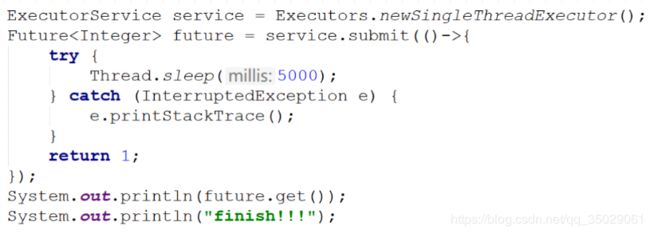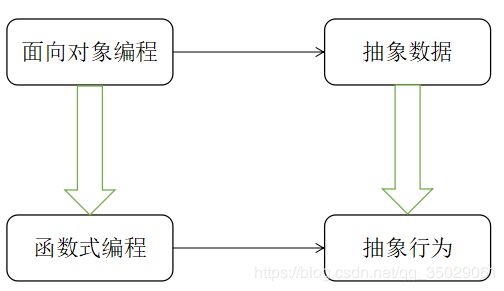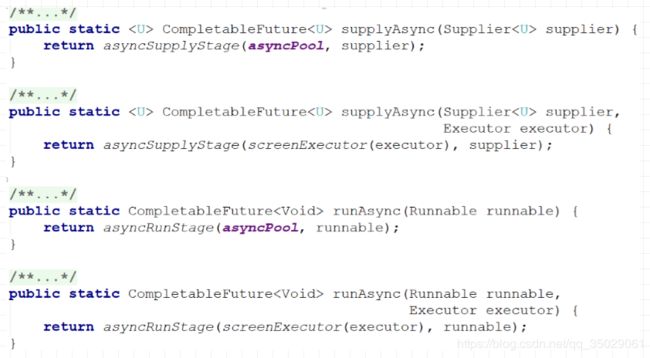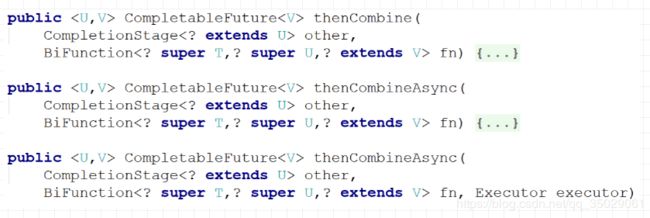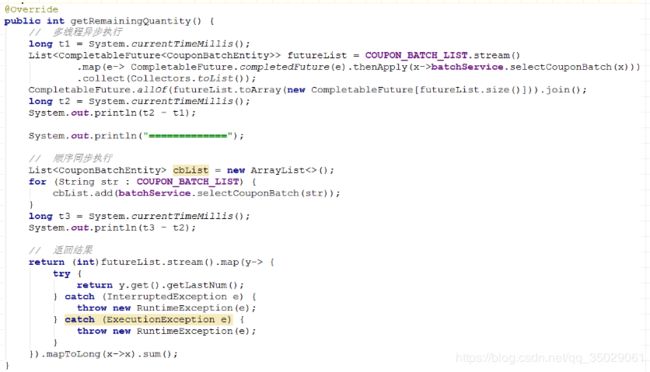深入学习java源码之CompletableFuture.reportGet()与CompletableFuture.supplyAsync()
深入学习java源码之CompletableFuture.reportGet()与CompletableFuture.supplyAsync()
异步计算
-
所谓异步调用其实就是实现一个可无需等待被调用函数的返回值而让操作继续运行的方法。在 Java 语言中,简单的讲就是另启一个线程来完成调用中的部分计算,使调用继续运行或返回,而不需要等待计算结果。但调用者仍需要取线程的计算结果。
-
JDK5新增了Future接口,用于描述一个异步计算的结果。虽然 Future 以及相关使用方法提供了异步执行任务的能力,但是对于结果的获取却是很不方便,只能通过阻塞或者轮询的方式得到任务的结果。阻塞的方式显然和我们的异步编程的初衷相违背,轮询的方式又会耗费无谓的 CPU 资源,而且也不能及时地得到计算结果。
- 以前我们获取一个异步任务的结果可能是这样写的
Future 接口的局限性
Future接口可以构建异步应用,但依然有其局限性。它很难直接表述多个Future 结果之间的依赖性。实际开发中,我们经常需要达成以下目的:
-
将多个异步计算的结果合并成一个
-
等待Future集合中的所有任务都完成
-
Future完成事件(即,任务完成以后触发执行动作)
- 。。。
函数式编程
CompletionStage
-
CompletionStage代表异步计算过程中的某一个阶段,一个阶段完成以后可能会触发另外一个阶段
-
一个阶段的计算执行可以是一个Function,Consumer或者Runnable。比如:stage.thenApply(x -> square(x)).thenAccept(x -> System.out.print(x)).thenRun(() -> System.out.println())
-
一个阶段的执行可能是被单个阶段的完成触发,也可能是由多个阶段一起触发
CompletableFuture
- 在Java8中,CompletableFuture提供了非常强大的Future的扩展功能,可以帮助我们简化异步编程的复杂性,并且提供了函数式编程的能力,可以通过回调的方式处理计算结果,也提供了转换和组合 CompletableFuture 的方法。
- 它可能代表一个明确完成的Future,也有可能代表一个完成阶段( CompletionStage ),它支持在计算完成以后触发一些函数或执行某些动作。
- 它实现了Future和CompletionStage接口
创建CompletableFuture
thenApply
当前阶段正常完成以后执行,而且当前阶段的执行的结果会作为下一阶段的输入参数。thenApplyAsync默认是异步执行的。这里所谓的异步指的是不在当前线程内执行。
thenApply相当于回调函数(callback)
thenAccept与thenRun
- 可以看到,thenAccept和thenRun都是无返回值的。如果说thenApply是不停的输入输出的进行生产,那么thenAccept和thenRun就是在进行消耗。它们是整个计算的最后两个阶段。
-
同样是执行指定的动作,同样是消耗,二者也有区别:
-
thenAccept接收上一阶段的输出作为本阶段的输入
- thenRun根本不关心前一阶段的输出,根本不不关心前一阶段的计算结果,因为它不需要输入参数
-
thenCombine整合两个计算结果
例如,此阶段与其它阶段一起完成,进而触发下一阶段:
whenComplete
例子
事实上,如果每个操作都很简单的话(比如:上面的例子中按照id去查)没有必要用这种多线程异步的方式,因为创建线程还需要时间,还不如直接同步执行来得快。
事实证明,只有当每个操作很复杂需要花费相对很长的时间(比如,调用多个其它的系统的接口;比如,商品详情页面这种需要从多个系统中查数据显示的)的时候用CompletableFuture才合适,不然区别真的不大,还不如顺序同步执行。
java源码
| Modifier and Type | Method and Description |
|---|---|
CompletableFuture |
acceptEither(CompletionStage other, Consumer action) 返回一个新的CompletionStage,当这个或另一个给定阶段正常完成时,执行相应的结果作为提供的操作的参数。 |
CompletableFuture |
acceptEitherAsync(CompletionStage other, Consumer action) 返回一个新的CompletionStage,当这个或另一个给定阶段正常完成时,将使用此阶段的默认异步执行工具执行,其中相应的结果作为提供的操作的参数。 |
CompletableFuture |
acceptEitherAsync(CompletionStage other, Consumer action, Executor executor) 返回一个新的CompletionStage,当这个或另一个给定阶段正常完成时,将使用提供的执行器执行,其中相应的结果作为参数提供给函数。 |
static CompletableFuture |
allOf(CompletableFuture... cfs) 返回一个新的CompletableFuture,当所有给定的CompletableFutures完成时,完成。 |
static CompletableFuture |
anyOf(CompletableFuture... cfs) 返回一个新的CompletableFuture,当任何一个给定的CompletableFutures完成时,完成相同的结果。 |
CompletableFuture |
applyToEither(CompletionStage other, Function fn) 返回一个新的CompletionStage,当这个或另一个给定阶段正常完成时,执行相应的结果作为提供的函数的参数。 |
CompletableFuture |
applyToEitherAsync(CompletionStage other, Function fn) 返回一个新的CompletionStage,当这个或另一个给定阶段正常完成时,将使用此阶段的默认异步执行工具执行,其中相应的结果作为提供函数的参数。 |
CompletableFuture |
applyToEitherAsync(CompletionStage other, Function fn, Executor executor) 返回一个新的CompletionStage,当这个或另一个给定阶段正常完成时,将使用提供的执行器执行,其中相应的结果作为参数提供给函数。 |
boolean |
cancel(boolean mayInterruptIfRunning) 如果尚未完成,请使用 |
boolean |
complete(T value) 如果不是已经完成,将返回的值 |
static CompletableFuture |
completedFuture(U value) 返回已经使用给定值完成的新的CompletableFuture。 |
boolean |
completeExceptionally(Throwable ex) 如果尚未完成,则调用 |
CompletableFuture |
exceptionally(Function 返回一个新的CompletableFuture,当CompletableFuture完成时完成,结果是异常触发此CompletableFuture的完成特殊功能的给定功能; 否则,如果此CompletableFuture正常完成,则返回的CompletableFuture也会以相同的值正常完成。 |
T |
get() 等待这个未来完成的必要,然后返回结果。 |
T |
get(long timeout, TimeUnit unit) 如果有必要等待这个未来完成的给定时间,然后返回其结果(如果有的话)。 |
T |
getNow(T valueIfAbsent) 如果已完成,则返回结果值(或抛出任何遇到的异常),否则返回给定的值IfAbsent。 |
int |
getNumberOfDependents() 返回完成等待完成此CompletableFuture的CompletableFutures的估计数。 |
CompletableFuture |
handle(BiFunction fn) 返回一个新的CompletionStage,当此阶段正常或异常完成时,将使用此阶段的结果和异常作为所提供函数的参数执行。 |
CompletableFuture |
handleAsync(BiFunction fn) 返回一个新的CompletionStage,当该阶段完成正常或异常时,将使用此阶段的默认异步执行工具执行,此阶段的结果和异常作为提供函数的参数。 |
CompletableFuture |
handleAsync(BiFunction fn, Executor executor) 返回一个新的CompletionStage,当此阶段完成正常或异常时,将使用提供的执行程序执行此阶段的结果和异常作为提供的函数的参数。 |
boolean |
isCancelled() 如果此CompletableFuture在正常完成之前被取消,则返回 |
boolean |
isCompletedExceptionally() 如果此CompletableFuture以任何方式完成异常完成,则返回 |
boolean |
isDone() 退货 |
T |
join() 完成后返回结果值,如果完成异常,则返回(未检查)异常。 |
void |
obtrudeException(Throwable ex) 强制导致后续调用方法 |
void |
obtrudeValue(T value) 强制设置或重置随后方法返回的值 |
CompletableFuture |
runAfterBoth(CompletionStage other, Runnable action) 返回一个新的CompletionStage,当这个和另一个给定的阶段都正常完成时,执行给定的动作。 |
CompletableFuture |
runAfterBothAsync(CompletionStage other, Runnable action) 返回一个新的CompletionStage,当这个和另一个给定阶段正常完成时,使用此阶段的默认异步执行工具执行给定的操作。 |
CompletableFuture |
runAfterBothAsync(CompletionStage other, Runnable action, Executor executor) 返回一个新CompletionStage,当这和其他特定阶段正常完成,使用附带的执行见执行给定的动作 |
CompletableFuture |
runAfterEither(CompletionStage other, Runnable action) 返回一个新的CompletionStage,当这个或另一个给定阶段正常完成时,执行给定的操作。 |
CompletableFuture |
runAfterEitherAsync(CompletionStage other, Runnable action) 返回一个新的CompletionStage,当这个或另一个给定阶段正常完成时,使用此阶段的默认异步执行工具执行给定的操作。 |
CompletableFuture |
runAfterEitherAsync(CompletionStage other, Runnable action, Executor executor) 返回一个新的CompletionStage,当这个或另一个给定阶段正常完成时,使用提供的执行器执行给定的操作。 |
static CompletableFuture |
runAsync(Runnable runnable) 返回一个新的CompletableFuture,它在运行给定操作后由运行在 |
static CompletableFuture |
runAsync(Runnable runnable, Executor executor) 返回一个新的CompletableFuture,它在运行给定操作之后由在给定执行程序中运行的任务异步完成。 |
static CompletableFuture |
supplyAsync(Supplier supplier) 返回一个新的CompletableFuture,它通过在 |
static CompletableFuture |
supplyAsync(Supplier supplier, Executor executor) 返回一个新的CompletableFuture,由给定执行器中运行的任务异步完成,并通过调用给定的供应商获得的值。 |
CompletableFuture |
thenAccept(Consumer action) 返回一个新的CompletionStage,当此阶段正常完成时,将以该阶段的结果作为提供的操作的参数执行。 |
CompletableFuture |
thenAcceptAsync(Consumer action) 返回一个新的CompletionStage,当此阶段正常完成时,将使用此阶段的默认异步执行工具执行,此阶段的结果作为提供的操作的参数。 |
CompletableFuture |
thenAcceptAsync(Consumer action, Executor executor) 返回一个新的CompletionStage,当此阶段正常完成时,将使用提供的执行程序执行此阶段的结果作为提供的操作的参数。 |
CompletableFuture |
thenAcceptBoth(CompletionStage other, BiConsumer action) 返回一个新的CompletionStage,当这个和另一个给定的阶段都正常完成时,两个结果作为提供的操作的参数被执行。 |
CompletableFuture |
thenAcceptBothAsync(CompletionStage other, BiConsumer action) 返回一个新的CompletionStage,当这个和另一个给定阶段正常完成时,将使用此阶段的默认异步执行工具执行,其中两个结果作为提供的操作的参数。 |
CompletableFuture |
thenAcceptBothAsync(CompletionStage other, BiConsumer action, Executor executor) 返回一个新的CompletionStage,当这个和另一个给定阶段正常完成时,使用提供的执行器执行,其中两个结果作为提供的函数的参数。 |
CompletableFuture |
thenApply(Function fn) 返回一个新的CompletionStage,当此阶段正常完成时,将以该阶段的结果作为所提供函数的参数执行。 |
CompletableFuture |
thenApplyAsync(Function fn) 返回一个新的CompletionStage,当该阶段正常完成时,将使用此阶段的默认异步执行工具执行此阶段的结果作为所提供函数的参数。 |
CompletableFuture |
thenApplyAsync(Function fn, Executor executor) 返回一个新的CompletionStage,当此阶段正常完成时,将使用提供的执行程序执行此阶段的结果作为提供函数的参数。 |
|
thenCombine(CompletionStage other, BiFunction fn) 返回一个新的CompletionStage,当这个和另一个给定的阶段都正常完成时,两个结果作为提供函数的参数执行。 |
|
thenCombineAsync(CompletionStage other, BiFunction fn) 返回一个新的CompletionStage,当这个和另一个给定阶段正常完成时,将使用此阶段的默认异步执行工具执行,其中两个结果作为提供函数的参数。 |
|
thenCombineAsync(CompletionStage other, BiFunction fn, Executor executor) 返回一个新的CompletionStage,当这个和另一个给定阶段正常完成时,使用提供的执行器执行,其中两个结果作为提供的函数的参数。 |
CompletableFuture |
thenCompose(Function> fn) 返回一个新的CompletionStage,当这个阶段正常完成时,这个阶段将作为提供函数的参数执行。 |
CompletableFuture |
thenComposeAsync(Function> fn) 返回一个新的CompletionStage,当此阶段正常完成时,将使用此阶段的默认异步执行工具执行,此阶段作为提供的函数的参数。 |
CompletableFuture |
thenComposeAsync(Function> fn, Executor executor) 返回一个新的CompletionStage,当此阶段正常完成时,将使用提供的执行程序执行此阶段的结果作为提供函数的参数。 |
CompletableFuture |
thenRun(Runnable action) 返回一个新的CompletionStage,当此阶段正常完成时,执行给定的操作。 |
CompletableFuture |
thenRunAsync(Runnable action) 返回一个新的CompletionStage,当此阶段正常完成时,使用此阶段的默认异步执行工具执行给定的操作。 |
CompletableFuture |
thenRunAsync(Runnable action, Executor executor) 返回一个新的CompletionStage,当此阶段正常完成时,使用提供的执行程序执行给定的操作。 |
CompletableFuture |
toCompletableFuture() 返回此CompletableFuture |
String |
toString() 返回一个标识此CompletableFuture的字符串及其完成状态。 |
CompletableFuture |
whenComplete(BiConsumer action) 返回与此阶段相同的结果或异常的新的CompletionStage,当此阶段完成时,使用结果(或 |
CompletableFuture |
whenCompleteAsync(BiConsumer action) 返回一个与此阶段相同结果或异常的新CompletionStage,当此阶段完成时,执行给定操作将使用此阶段的默认异步执行工具执行给定操作,结果(或 |
CompletableFuture |
whenCompleteAsync(BiConsumer action, Executor executor) 返回与此阶段相同的结果或异常的新的CompletionStage,当此阶段完成时,使用提供的执行者执行给定的操作,如果没有,则使用结果(或 |
package java.util.concurrent;
import java.util.function.Supplier;
import java.util.function.Consumer;
import java.util.function.BiConsumer;
import java.util.function.Function;
import java.util.function.BiFunction;
import java.util.concurrent.Future;
import java.util.concurrent.TimeUnit;
import java.util.concurrent.ForkJoinPool;
import java.util.concurrent.ForkJoinTask;
import java.util.concurrent.Executor;
import java.util.concurrent.ThreadLocalRandom;
import java.util.concurrent.ExecutionException;
import java.util.concurrent.TimeoutException;
import java.util.concurrent.CancellationException;
import java.util.concurrent.CompletionException;
import java.util.concurrent.CompletionStage;
import java.util.concurrent.locks.LockSupport;
public class CompletableFuture implements Future, CompletionStage {
volatile Object result; // Either the result or boxed AltResult
volatile Completion stack; // Top of Treiber stack of dependent actions
final boolean internalComplete(Object r) { // CAS from null to r
return UNSAFE.compareAndSwapObject(this, RESULT, null, r);
}
final boolean casStack(Completion cmp, Completion val) {
return UNSAFE.compareAndSwapObject(this, STACK, cmp, val);
}
/** Returns true if successfully pushed c onto stack. */
final boolean tryPushStack(Completion c) {
Completion h = stack;
lazySetNext(c, h);
return UNSAFE.compareAndSwapObject(this, STACK, h, c);
}
final void pushStack(Completion c) {
do {} while (!tryPushStack(c));
}
/* ------------- Encoding and decoding outcomes -------------- */
static final class AltResult { // See above
final Throwable ex; // null only for NIL
AltResult(Throwable x) { this.ex = x; }
}
/** The encoding of the null value. */
static final AltResult NIL = new AltResult(null);
/** Completes with the null value, unless already completed. */
final boolean completeNull() {
return UNSAFE.compareAndSwapObject(this, RESULT, null,
NIL);
}
/** Returns the encoding of the given non-exceptional value. */
final Object encodeValue(T t) {
return (t == null) ? NIL : t;
}
/** Completes with a non-exceptional result, unless already completed. */
final boolean completeValue(T t) {
return UNSAFE.compareAndSwapObject(this, RESULT, null,
(t == null) ? NIL : t);
}
static AltResult encodeThrowable(Throwable x) {
return new AltResult((x instanceof CompletionException) ? x :
new CompletionException(x));
}
/** Completes with an exceptional result, unless already completed. */
final boolean completeThrowable(Throwable x) {
return UNSAFE.compareAndSwapObject(this, RESULT, null,
encodeThrowable(x));
}
static Object encodeThrowable(Throwable x, Object r) {
if (!(x instanceof CompletionException))
x = new CompletionException(x);
else if (r instanceof AltResult && x == ((AltResult)r).ex)
return r;
return new AltResult(x);
}
final boolean completeThrowable(Throwable x, Object r) {
return UNSAFE.compareAndSwapObject(this, RESULT, null,
encodeThrowable(x, r));
}
Object encodeOutcome(T t, Throwable x) {
return (x == null) ? (t == null) ? NIL : t : encodeThrowable(x);
}
static Object encodeRelay(Object r) {
Throwable x;
return (((r instanceof AltResult) &&
(x = ((AltResult)r).ex) != null &&
!(x instanceof CompletionException)) ?
new AltResult(new CompletionException(x)) : r);
}
final boolean completeRelay(Object r) {
return UNSAFE.compareAndSwapObject(this, RESULT, null,
encodeRelay(r));
}
private static T reportGet(Object r)
throws InterruptedException, ExecutionException {
if (r == null) // by convention below, null means interrupted
throw new InterruptedException();
if (r instanceof AltResult) {
Throwable x, cause;
if ((x = ((AltResult)r).ex) == null)
return null;
if (x instanceof CancellationException)
throw (CancellationException)x;
if ((x instanceof CompletionException) &&
(cause = x.getCause()) != null)
x = cause;
throw new ExecutionException(x);
}
@SuppressWarnings("unchecked") T t = (T) r;
return t;
}
private static T reportJoin(Object r) {
if (r instanceof AltResult) {
Throwable x;
if ((x = ((AltResult)r).ex) == null)
return null;
if (x instanceof CancellationException)
throw (CancellationException)x;
if (x instanceof CompletionException)
throw (CompletionException)x;
throw new CompletionException(x);
}
@SuppressWarnings("unchecked") T t = (T) r;
return t;
}
/* ------------- Async task preliminaries -------------- */
public static interface AsynchronousCompletionTask {
}
private static final boolean useCommonPool =
(ForkJoinPool.getCommonPoolParallelism() > 1);
private static final Executor asyncPool = useCommonPool ?
ForkJoinPool.commonPool() : new ThreadPerTaskExecutor();
/** Fallback if ForkJoinPool.commonPool() cannot support parallelism */
static final class ThreadPerTaskExecutor implements Executor {
public void execute(Runnable r) { new Thread(r).start(); }
}
static Executor screenExecutor(Executor e) {
if (!useCommonPool && e == ForkJoinPool.commonPool())
return asyncPool;
if (e == null) throw new NullPointerException();
return e;
}
// Modes for Completion.tryFire. Signedness matters.
static final int SYNC = 0;
static final int ASYNC = 1;
static final int NESTED = -1;
/* ------------- Base Completion classes and operations -------------- */
@SuppressWarnings("serial")
abstract static class Completion extends ForkJoinTask
implements Runnable, AsynchronousCompletionTask {
volatile Completion next; // Treiber stack link
abstract CompletableFuture tryFire(int mode);
/** Returns true if possibly still triggerable. Used by cleanStack. */
abstract boolean isLive();
public final void run() { tryFire(ASYNC); }
public final boolean exec() { tryFire(ASYNC); return true; }
public final Void getRawResult() { return null; }
public final void setRawResult(Void v) {}
}
static void lazySetNext(Completion c, Completion next) {
UNSAFE.putOrderedObject(c, NEXT, next);
}
final void postComplete() {
CompletableFuture f = this; Completion h;
while ((h = f.stack) != null ||
(f != this && (h = (f = this).stack) != null)) {
CompletableFuture d; Completion t;
if (f.casStack(h, t = h.next)) {
if (t != null) {
if (f != this) {
pushStack(h);
continue;
}
h.next = null; // detach
}
f = (d = h.tryFire(NESTED)) == null ? this : d;
}
}
}
/** Traverses stack and unlinks dead Completions. */
final void cleanStack() {
for (Completion p = null, q = stack; q != null;) {
Completion s = q.next;
if (q.isLive()) {
p = q;
q = s;
}
else if (p == null) {
casStack(q, s);
q = stack;
}
else {
p.next = s;
if (p.isLive())
q = s;
else {
p = null; // restart
q = stack;
}
}
}
}
/* ------------- One-input Completions -------------- */
/** A Completion with a source, dependent, and executor. */
@SuppressWarnings("serial")
abstract static class UniCompletion extends Completion {
Executor executor; // executor to use (null if none)
CompletableFuture dep; // the dependent to complete
CompletableFuture src; // source for action
UniCompletion(Executor executor, CompletableFuture dep,
CompletableFuture src) {
this.executor = executor; this.dep = dep; this.src = src;
}
final boolean claim() {
Executor e = executor;
if (compareAndSetForkJoinTaskTag((short)0, (short)1)) {
if (e == null)
return true;
executor = null; // disable
e.execute(this);
}
return false;
}
final boolean isLive() { return dep != null; }
}
/** Pushes the given completion (if it exists) unless done. */
final void push(UniCompletion c) {
if (c != null) {
while (result == null && !tryPushStack(c))
lazySetNext(c, null); // clear on failure
}
}
final CompletableFuture postFire(CompletableFuture a, int mode) {
if (a != null && a.stack != null) {
if (mode < 0 || a.result == null)
a.cleanStack();
else
a.postComplete();
}
if (result != null && stack != null) {
if (mode < 0)
return this;
else
postComplete();
}
return null;
}
@SuppressWarnings("serial")
static final class UniApply extends UniCompletion {
Function fn;
UniApply(Executor executor, CompletableFuture dep,
CompletableFuture src,
Function fn) {
super(executor, dep, src); this.fn = fn;
}
final CompletableFuture tryFire(int mode) {
CompletableFuture d; CompletableFuture a;
if ((d = dep) == null ||
!d.uniApply(a = src, fn, mode > 0 ? null : this))
return null;
dep = null; src = null; fn = null;
return d.postFire(a, mode);
}
}
final boolean uniApply(CompletableFuture a,
Function f,
UniApply c) {
Object r; Throwable x;
if (a == null || (r = a.result) == null || f == null)
return false;
tryComplete: if (result == null) {
if (r instanceof AltResult) {
if ((x = ((AltResult)r).ex) != null) {
completeThrowable(x, r);
break tryComplete;
}
r = null;
}
try {
if (c != null && !c.claim())
return false;
@SuppressWarnings("unchecked") S s = (S) r;
completeValue(f.apply(s));
} catch (Throwable ex) {
completeThrowable(ex);
}
}
return true;
}
private CompletableFuture uniApplyStage(
Executor e, Function f) {
if (f == null) throw new NullPointerException();
CompletableFuture d = new CompletableFuture();
if (e != null || !d.uniApply(this, f, null)) {
UniApply c = new UniApply(e, d, this, f);
push(c);
c.tryFire(SYNC);
}
return d;
}
@SuppressWarnings("serial")
static final class UniAccept extends UniCompletion {
Consumer fn;
UniAccept(Executor executor, CompletableFuture dep,
CompletableFuture src, Consumer fn) {
super(executor, dep, src); this.fn = fn;
}
final CompletableFuture tryFire(int mode) {
CompletableFuture d; CompletableFuture a;
if ((d = dep) == null ||
!d.uniAccept(a = src, fn, mode > 0 ? null : this))
return null;
dep = null; src = null; fn = null;
return d.postFire(a, mode);
}
}
final boolean uniAccept(CompletableFuture a,
Consumer f, UniAccept c) {
Object r; Throwable x;
if (a == null || (r = a.result) == null || f == null)
return false;
tryComplete: if (result == null) {
if (r instanceof AltResult) {
if ((x = ((AltResult)r).ex) != null) {
completeThrowable(x, r);
break tryComplete;
}
r = null;
}
try {
if (c != null && !c.claim())
return false;
@SuppressWarnings("unchecked") S s = (S) r;
f.accept(s);
completeNull();
} catch (Throwable ex) {
completeThrowable(ex);
}
}
return true;
}
private CompletableFuture uniAcceptStage(Executor e,
Consumer f) {
if (f == null) throw new NullPointerException();
CompletableFuture d = new CompletableFuture();
if (e != null || !d.uniAccept(this, f, null)) {
UniAccept c = new UniAccept(e, d, this, f);
push(c);
c.tryFire(SYNC);
}
return d;
}
@SuppressWarnings("serial")
static final class UniRun extends UniCompletion {
Runnable fn;
UniRun(Executor executor, CompletableFuture dep,
CompletableFuture src, Runnable fn) {
super(executor, dep, src); this.fn = fn;
}
final CompletableFuture tryFire(int mode) {
CompletableFuture d; CompletableFuture a;
if ((d = dep) == null ||
!d.uniRun(a = src, fn, mode > 0 ? null : this))
return null;
dep = null; src = null; fn = null;
return d.postFire(a, mode);
}
}
final boolean uniRun(CompletableFuture a, Runnable f, UniRun c) {
Object r; Throwable x;
if (a == null || (r = a.result) == null || f == null)
return false;
if (result == null) {
if (r instanceof AltResult && (x = ((AltResult)r).ex) != null)
completeThrowable(x, r);
else
try {
if (c != null && !c.claim())
return false;
f.run();
completeNull();
} catch (Throwable ex) {
completeThrowable(ex);
}
}
return true;
}
private CompletableFuture uniRunStage(Executor e, Runnable f) {
if (f == null) throw new NullPointerException();
CompletableFuture d = new CompletableFuture();
if (e != null || !d.uniRun(this, f, null)) {
UniRun c = new UniRun(e, d, this, f);
push(c);
c.tryFire(SYNC);
}
return d;
}
@SuppressWarnings("serial")
static final class UniWhenComplete extends UniCompletion {
BiConsumer fn;
UniWhenComplete(Executor executor, CompletableFuture dep,
CompletableFuture src,
BiConsumer fn) {
super(executor, dep, src); this.fn = fn;
}
final CompletableFuture tryFire(int mode) {
CompletableFuture d; CompletableFuture a;
if ((d = dep) == null ||
!d.uniWhenComplete(a = src, fn, mode > 0 ? null : this))
return null;
dep = null; src = null; fn = null;
return d.postFire(a, mode);
}
}
final boolean uniWhenComplete(CompletableFuture a,
BiConsumer f,
UniWhenComplete c) {
Object r; T t; Throwable x = null;
if (a == null || (r = a.result) == null || f == null)
return false;
if (result == null) {
try {
if (c != null && !c.claim())
return false;
if (r instanceof AltResult) {
x = ((AltResult)r).ex;
t = null;
} else {
@SuppressWarnings("unchecked") T tr = (T) r;
t = tr;
}
f.accept(t, x);
if (x == null) {
internalComplete(r);
return true;
}
} catch (Throwable ex) {
if (x == null)
x = ex;
}
completeThrowable(x, r);
}
return true;
}
private CompletableFuture uniWhenCompleteStage(
Executor e, BiConsumer f) {
if (f == null) throw new NullPointerException();
CompletableFuture d = new CompletableFuture();
if (e != null || !d.uniWhenComplete(this, f, null)) {
UniWhenComplete c = new UniWhenComplete(e, d, this, f);
push(c);
c.tryFire(SYNC);
}
return d;
}
@SuppressWarnings("serial")
static final class UniHandle extends UniCompletion {
BiFunction fn;
UniHandle(Executor executor, CompletableFuture dep,
CompletableFuture src,
BiFunction fn) {
super(executor, dep, src); this.fn = fn;
}
final CompletableFuture tryFire(int mode) {
CompletableFuture d; CompletableFuture a;
if ((d = dep) == null ||
!d.uniHandle(a = src, fn, mode > 0 ? null : this))
return null;
dep = null; src = null; fn = null;
return d.postFire(a, mode);
}
}
final boolean uniHandle(CompletableFuture a,
BiFunction f,
UniHandle c) {
Object r; S s; Throwable x;
if (a == null || (r = a.result) == null || f == null)
return false;
if (result == null) {
try {
if (c != null && !c.claim())
return false;
if (r instanceof AltResult) {
x = ((AltResult)r).ex;
s = null;
} else {
x = null;
@SuppressWarnings("unchecked") S ss = (S) r;
s = ss;
}
completeValue(f.apply(s, x));
} catch (Throwable ex) {
completeThrowable(ex);
}
}
return true;
}
private CompletableFuture uniHandleStage(
Executor e, BiFunction f) {
if (f == null) throw new NullPointerException();
CompletableFuture d = new CompletableFuture();
if (e != null || !d.uniHandle(this, f, null)) {
UniHandle c = new UniHandle(e, d, this, f);
push(c);
c.tryFire(SYNC);
}
return d;
}
@SuppressWarnings("serial")
static final class UniExceptionally extends UniCompletion {
Function fn;
UniExceptionally(CompletableFuture dep, CompletableFuture src,
Function fn) {
super(null, dep, src); this.fn = fn;
}
final CompletableFuture tryFire(int mode) { // never ASYNC
// assert mode != ASYNC;
CompletableFuture d; CompletableFuture a;
if ((d = dep) == null || !d.uniExceptionally(a = src, fn, this))
return null;
dep = null; src = null; fn = null;
return d.postFire(a, mode);
}
}
final boolean uniExceptionally(CompletableFuture a,
Function f,
UniExceptionally c) {
Object r; Throwable x;
if (a == null || (r = a.result) == null || f == null)
return false;
if (result == null) {
try {
if (r instanceof AltResult && (x = ((AltResult)r).ex) != null) {
if (c != null && !c.claim())
return false;
completeValue(f.apply(x));
} else
internalComplete(r);
} catch (Throwable ex) {
completeThrowable(ex);
}
}
return true;
}
private CompletableFuture uniExceptionallyStage(
Function f) {
if (f == null) throw new NullPointerException();
CompletableFuture d = new CompletableFuture();
if (!d.uniExceptionally(this, f, null)) {
UniExceptionally c = new UniExceptionally(d, this, f);
push(c);
c.tryFire(SYNC);
}
return d;
}
@SuppressWarnings("serial")
static final class UniRelay extends UniCompletion { // for Compose
UniRelay(CompletableFuture dep, CompletableFuture src) {
super(null, dep, src);
}
final CompletableFuture tryFire(int mode) {
CompletableFuture d; CompletableFuture a;
if ((d = dep) == null || !d.uniRelay(a = src))
return null;
src = null; dep = null;
return d.postFire(a, mode);
}
}
final boolean uniRelay(CompletableFuture a) {
Object r;
if (a == null || (r = a.result) == null)
return false;
if (result == null) // no need to claim
completeRelay(r);
return true;
}
@SuppressWarnings("serial")
static final class UniCompose extends UniCompletion {
Function> fn;
UniCompose(Executor executor, CompletableFuture dep,
CompletableFuture src,
Function> fn) {
super(executor, dep, src); this.fn = fn;
}
final CompletableFuture tryFire(int mode) {
CompletableFuture d; CompletableFuture a;
if ((d = dep) == null ||
!d.uniCompose(a = src, fn, mode > 0 ? null : this))
return null;
dep = null; src = null; fn = null;
return d.postFire(a, mode);
}
}
final boolean uniCompose(
CompletableFuture a,
Function> f,
UniCompose c) {
Object r; Throwable x;
if (a == null || (r = a.result) == null || f == null)
return false;
tryComplete: if (result == null) {
if (r instanceof AltResult) {
if ((x = ((AltResult)r).ex) != null) {
completeThrowable(x, r);
break tryComplete;
}
r = null;
}
try {
if (c != null && !c.claim())
return false;
@SuppressWarnings("unchecked") S s = (S) r;
CompletableFuture g = f.apply(s).toCompletableFuture();
if (g.result == null || !uniRelay(g)) {
UniRelay copy = new UniRelay(this, g);
g.push(copy);
copy.tryFire(SYNC);
if (result == null)
return false;
}
} catch (Throwable ex) {
completeThrowable(ex);
}
}
return true;
}
private CompletableFuture uniComposeStage(
Executor e, Function> f) {
if (f == null) throw new NullPointerException();
Object r; Throwable x;
if (e == null && (r = result) != null) {
// try to return function result directly
if (r instanceof AltResult) {
if ((x = ((AltResult)r).ex) != null) {
return new CompletableFuture(encodeThrowable(x, r));
}
r = null;
}
try {
@SuppressWarnings("unchecked") T t = (T) r;
CompletableFuture g = f.apply(t).toCompletableFuture();
Object s = g.result;
if (s != null)
return new CompletableFuture(encodeRelay(s));
CompletableFuture d = new CompletableFuture();
UniRelay copy = new UniRelay(d, g);
g.push(copy);
copy.tryFire(SYNC);
return d;
} catch (Throwable ex) {
return new CompletableFuture(encodeThrowable(ex));
}
}
CompletableFuture d = new CompletableFuture();
UniCompose c = new UniCompose(e, d, this, f);
push(c);
c.tryFire(SYNC);
return d;
}
/* ------------- Two-input Completions -------------- */
/** A Completion for an action with two sources */
@SuppressWarnings("serial")
abstract static class BiCompletion extends UniCompletion {
CompletableFuture snd; // second source for action
BiCompletion(Executor executor, CompletableFuture dep,
CompletableFuture src, CompletableFuture snd) {
super(executor, dep, src); this.snd = snd;
}
}
/** A Completion delegating to a BiCompletion */
@SuppressWarnings("serial")
static final class CoCompletion extends Completion {
BiCompletion base;
CoCompletion(BiCompletion base) { this.base = base; }
final CompletableFuture tryFire(int mode) {
BiCompletion c; CompletableFuture d;
if ((c = base) == null || (d = c.tryFire(mode)) == null)
return null;
base = null; // detach
return d;
}
final boolean isLive() {
BiCompletion c;
return (c = base) != null && c.dep != null;
}
}
/** Pushes completion to this and b unless both done. */
final void bipush(CompletableFuture b, BiCompletion c) {
if (c != null) {
Object r;
while ((r = result) == null && !tryPushStack(c))
lazySetNext(c, null); // clear on failure
if (b != null && b != this && b.result == null) {
Completion q = (r != null) ? c : new CoCompletion(c);
while (b.result == null && !b.tryPushStack(q))
lazySetNext(q, null); // clear on failure
}
}
}
/** Post-processing after successful BiCompletion tryFire. */
final CompletableFuture postFire(CompletableFuture a,
CompletableFuture b, int mode) {
if (b != null && b.stack != null) { // clean second source
if (mode < 0 || b.result == null)
b.cleanStack();
else
b.postComplete();
}
return postFire(a, mode);
}
@SuppressWarnings("serial")
static final class BiApply extends BiCompletion {
BiFunction fn;
BiApply(Executor executor, CompletableFuture dep,
CompletableFuture src, CompletableFuture snd,
BiFunction fn) {
super(executor, dep, src, snd); this.fn = fn;
}
final CompletableFuture tryFire(int mode) {
CompletableFuture d;
CompletableFuture a;
CompletableFuture b;
if ((d = dep) == null ||
!d.biApply(a = src, b = snd, fn, mode > 0 ? null : this))
return null;
dep = null; src = null; snd = null; fn = null;
return d.postFire(a, b, mode);
}
}
final boolean biApply(CompletableFuture a,
CompletableFuture b,
BiFunction f,
BiApply c) {
Object r, s; Throwable x;
if (a == null || (r = a.result) == null ||
b == null || (s = b.result) == null || f == null)
return false;
tryComplete: if (result == null) {
if (r instanceof AltResult) {
if ((x = ((AltResult)r).ex) != null) {
completeThrowable(x, r);
break tryComplete;
}
r = null;
}
if (s instanceof AltResult) {
if ((x = ((AltResult)s).ex) != null) {
completeThrowable(x, s);
break tryComplete;
}
s = null;
}
try {
if (c != null && !c.claim())
return false;
@SuppressWarnings("unchecked") R rr = (R) r;
@SuppressWarnings("unchecked") S ss = (S) s;
completeValue(f.apply(rr, ss));
} catch (Throwable ex) {
completeThrowable(ex);
}
}
return true;
}
private CompletableFuture biApplyStage(
Executor e, CompletionStage o,
BiFunction f) {
CompletableFuture b;
if (f == null || (b = o.toCompletableFuture()) == null)
throw new NullPointerException();
CompletableFuture d = new CompletableFuture();
if (e != null || !d.biApply(this, b, f, null)) {
BiApply c = new BiApply(e, d, this, b, f);
bipush(b, c);
c.tryFire(SYNC);
}
return d;
}
@SuppressWarnings("serial")
static final class BiAccept extends BiCompletion {
BiConsumer fn;
BiAccept(Executor executor, CompletableFuture dep,
CompletableFuture src, CompletableFuture snd,
BiConsumer fn) {
super(executor, dep, src, snd); this.fn = fn;
}
final CompletableFuture tryFire(int mode) {
CompletableFuture d;
CompletableFuture a;
CompletableFuture b;
if ((d = dep) == null ||
!d.biAccept(a = src, b = snd, fn, mode > 0 ? null : this))
return null;
dep = null; src = null; snd = null; fn = null;
return d.postFire(a, b, mode);
}
}
final boolean biAccept(CompletableFuture a,
CompletableFuture b,
BiConsumer f,
BiAccept c) {
Object r, s; Throwable x;
if (a == null || (r = a.result) == null ||
b == null || (s = b.result) == null || f == null)
return false;
tryComplete: if (result == null) {
if (r instanceof AltResult) {
if ((x = ((AltResult)r).ex) != null) {
completeThrowable(x, r);
break tryComplete;
}
r = null;
}
if (s instanceof AltResult) {
if ((x = ((AltResult)s).ex) != null) {
completeThrowable(x, s);
break tryComplete;
}
s = null;
}
try {
if (c != null && !c.claim())
return false;
@SuppressWarnings("unchecked") R rr = (R) r;
@SuppressWarnings("unchecked") S ss = (S) s;
f.accept(rr, ss);
completeNull();
} catch (Throwable ex) {
completeThrowable(ex);
}
}
return true;
}
private CompletableFuture biAcceptStage(
Executor e, CompletionStage o,
BiConsumer f) {
CompletableFuture b;
if (f == null || (b = o.toCompletableFuture()) == null)
throw new NullPointerException();
CompletableFuture d = new CompletableFuture();
if (e != null || !d.biAccept(this, b, f, null)) {
BiAccept c = new BiAccept(e, d, this, b, f);
bipush(b, c);
c.tryFire(SYNC);
}
return d;
}
@SuppressWarnings("serial")
static final class BiRun extends BiCompletion {
Runnable fn;
BiRun(Executor executor, CompletableFuture dep,
CompletableFuture src,
CompletableFuture snd,
Runnable fn) {
super(executor, dep, src, snd); this.fn = fn;
}
final CompletableFuture tryFire(int mode) {
CompletableFuture d;
CompletableFuture a;
CompletableFuture b;
if ((d = dep) == null ||
!d.biRun(a = src, b = snd, fn, mode > 0 ? null : this))
return null;
dep = null; src = null; snd = null; fn = null;
return d.postFire(a, b, mode);
}
}
final boolean biRun(CompletableFuture a, CompletableFuture b,
Runnable f, BiRun c) {
Object r, s; Throwable x;
if (a == null || (r = a.result) == null ||
b == null || (s = b.result) == null || f == null)
return false;
if (result == null) {
if (r instanceof AltResult && (x = ((AltResult)r).ex) != null)
completeThrowable(x, r);
else if (s instanceof AltResult && (x = ((AltResult)s).ex) != null)
completeThrowable(x, s);
else
try {
if (c != null && !c.claim())
return false;
f.run();
completeNull();
} catch (Throwable ex) {
completeThrowable(ex);
}
}
return true;
}
private CompletableFuture biRunStage(Executor e, CompletionStage o,
Runnable f) {
CompletableFuture b;
if (f == null || (b = o.toCompletableFuture()) == null)
throw new NullPointerException();
CompletableFuture d = new CompletableFuture();
if (e != null || !d.biRun(this, b, f, null)) {
BiRun c = new BiRun<>(e, d, this, b, f);
bipush(b, c);
c.tryFire(SYNC);
}
return d;
}
@SuppressWarnings("serial")
static final class BiRelay extends BiCompletion { // for And
BiRelay(CompletableFuture dep,
CompletableFuture src,
CompletableFuture snd) {
super(null, dep, src, snd);
}
final CompletableFuture tryFire(int mode) {
CompletableFuture d;
CompletableFuture a;
CompletableFuture b;
if ((d = dep) == null || !d.biRelay(a = src, b = snd))
return null;
src = null; snd = null; dep = null;
return d.postFire(a, b, mode);
}
}
boolean biRelay(CompletableFuture a, CompletableFuture b) {
Object r, s; Throwable x;
if (a == null || (r = a.result) == null ||
b == null || (s = b.result) == null)
return false;
if (result == null) {
if (r instanceof AltResult && (x = ((AltResult)r).ex) != null)
completeThrowable(x, r);
else if (s instanceof AltResult && (x = ((AltResult)s).ex) != null)
completeThrowable(x, s);
else
completeNull();
}
return true;
}
/** Recursively constructs a tree of completions. */
static CompletableFuture andTree(CompletableFuture[] cfs,
int lo, int hi) {
CompletableFuture d = new CompletableFuture();
if (lo > hi) // empty
d.result = NIL;
else {
CompletableFuture a, b;
int mid = (lo + hi) >>> 1;
if ((a = (lo == mid ? cfs[lo] :
andTree(cfs, lo, mid))) == null ||
(b = (lo == hi ? a : (hi == mid+1) ? cfs[hi] :
andTree(cfs, mid+1, hi))) == null)
throw new NullPointerException();
if (!d.biRelay(a, b)) {
BiRelay c = new BiRelay<>(d, a, b);
a.bipush(b, c);
c.tryFire(SYNC);
}
}
return d;
}
/* ------------- Projected (Ored) BiCompletions -------------- */
/** Pushes completion to this and b unless either done. */
final void orpush(CompletableFuture b, BiCompletion c) {
if (c != null) {
while ((b == null || b.result == null) && result == null) {
if (tryPushStack(c)) {
if (b != null && b != this && b.result == null) {
Completion q = new CoCompletion(c);
while (result == null && b.result == null &&
!b.tryPushStack(q))
lazySetNext(q, null); // clear on failure
}
break;
}
lazySetNext(c, null); // clear on failure
}
}
}
@SuppressWarnings("serial")
static final class OrApply extends BiCompletion {
Function fn;
OrApply(Executor executor, CompletableFuture dep,
CompletableFuture src,
CompletableFuture snd,
Function fn) {
super(executor, dep, src, snd); this.fn = fn;
}
final CompletableFuture tryFire(int mode) {
CompletableFuture d;
CompletableFuture a;
CompletableFuture b;
if ((d = dep) == null ||
!d.orApply(a = src, b = snd, fn, mode > 0 ? null : this))
return null;
dep = null; src = null; snd = null; fn = null;
return d.postFire(a, b, mode);
}
}
final boolean orApply(CompletableFuture a,
CompletableFuture b,
Function f,
OrApply c) {
Object r; Throwable x;
if (a == null || b == null ||
((r = a.result) == null && (r = b.result) == null) || f == null)
return false;
tryComplete: if (result == null) {
try {
if (c != null && !c.claim())
return false;
if (r instanceof AltResult) {
if ((x = ((AltResult)r).ex) != null) {
completeThrowable(x, r);
break tryComplete;
}
r = null;
}
@SuppressWarnings("unchecked") R rr = (R) r;
completeValue(f.apply(rr));
} catch (Throwable ex) {
completeThrowable(ex);
}
}
return true;
}
private CompletableFuture orApplyStage(
Executor e, CompletionStage o,
Function f) {
CompletableFuture b;
if (f == null || (b = o.toCompletableFuture()) == null)
throw new NullPointerException();
CompletableFuture d = new CompletableFuture();
if (e != null || !d.orApply(this, b, f, null)) {
OrApply c = new OrApply(e, d, this, b, f);
orpush(b, c);
c.tryFire(SYNC);
}
return d;
}
@SuppressWarnings("serial")
static final class OrAccept extends BiCompletion {
Consumer fn;
OrAccept(Executor executor, CompletableFuture dep,
CompletableFuture src,
CompletableFuture snd,
Consumer fn) {
super(executor, dep, src, snd); this.fn = fn;
}
final CompletableFuture tryFire(int mode) {
CompletableFuture d;
CompletableFuture a;
CompletableFuture b;
if ((d = dep) == null ||
!d.orAccept(a = src, b = snd, fn, mode > 0 ? null : this))
return null;
dep = null; src = null; snd = null; fn = null;
return d.postFire(a, b, mode);
}
}
final boolean orAccept(CompletableFuture a,
CompletableFuture b,
Consumer f,
OrAccept c) {
Object r; Throwable x;
if (a == null || b == null ||
((r = a.result) == null && (r = b.result) == null) || f == null)
return false;
tryComplete: if (result == null) {
try {
if (c != null && !c.claim())
return false;
if (r instanceof AltResult) {
if ((x = ((AltResult)r).ex) != null) {
completeThrowable(x, r);
break tryComplete;
}
r = null;
}
@SuppressWarnings("unchecked") R rr = (R) r;
f.accept(rr);
completeNull();
} catch (Throwable ex) {
completeThrowable(ex);
}
}
return true;
}
private 